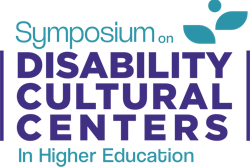Fall 2022 will be the third start to an academic year during the COVID-19 pandemic that has killed over six million people worldwide and one million Americans.
For disabled students, faculty, and staff, many at higher risk of COVID-19 related complications, the pandemic presented a strange silver lining—classes, conferences, meetings, and socialization moved online. This sudden adjustment to asynchronous, virtual learning allowed many with physical or mental disabilities open access to their education.
Earlier this month, the CDC released its newest guidance for how the public should behave with COVID-19. While continuing to encourage vaccinations, the CDC ended its recommendation to quarantine after known exposure to COVID, instead urging the wearing of high-quality masks. It also no longer encourages schools and other similar institutions to run tests on asymptomatic individuals.
 Helen Rottier, doctoral student in disability studies at University of Illinois Chicago.
Helen Rottier, doctoral student in disability studies at University of Illinois Chicago.
The new regulations are coupling with academia’s push to return to in-person, often at the expense of the online flexibility that benefitted many in the disabled community. At the University of Illinois Chicago (UIC), students and teachers in the disability studies program and at the Disability Cultural Center are concerned that access to online and asynchronous learning options will disappear even while COVID continues to spread.
“[This new guidance] enables institutions, especially colleges and universities, to make rules based on their own motivators, whether that’s campus culture and politics or what they think is going to get students to enroll and pay for classes,” said Helen Rottier, a doctoral student in disability studies at UIC.
“I think students are fearful that they’ve been excluded from their school communities because of the steps being taken to really push for in-person,” said Rottier. “Removing the [remote] option, that we have demonstrated is possible, is just a slap in the face to disabled people who, for the first time, were able to attend big disability community events, to engage with educational content.”
Rottier has studied the experiences of disabled students, faculty and staff in academia since 2017, a time when many disabled student and faculty groups were advocating for online or asynchronous learning and were told no.
“The reasons we were told ‘no’ pre-pandemic are similar to the reasons we’re told now to push for returning to in-person—[in-person] is more engaging, concerns about ‘learning loss’—I say that in quotations,” said Rottier. “[While online,] students were learning, adapting, and adjusting. They were still learning things and still growing as people in an untenable social situation. The disability community has been doing connectedness from our homes and safe spaces for over a decade. As long as social media has been around, we’ve had this beautiful, blossoming disability online community.”
Rottier acknowledged that online-learning is not effective for all students and faculty, but she added that she hopes institutions will realize that, for some, online-instruction is the best option.
“Really, having options is what accessibility is about. There is not a one-size-fits-all for anything, especially education,” said Rottier. “I am worried, but I’m also hopeful that the disability community will use COVID as an example, how we can pivot to remote, online options. Now we can say, ‘Look, it’s possible.’”
When the pandemic began in March 2020, Javin D’Souza was an undergrad at the University of Southern California (USC) in Los Angeles, advocating for USC to build a disability cultural center. The pandemic brought those efforts to a halt, and D’Souza ultimately chose to return home to Chicago and take courses online because it felt safer there.
 Javin D’Souza, graduate assistant at the University of Illinois Chicago's Disability Cultural Center.
Javin D’Souza, graduate assistant at the University of Illinois Chicago's Disability Cultural Center.
D’Souza said the best way to fight the pandemic is masking, but added that masking has less of a chance of being effective if the masks are worn incorrectly, inconsistently, and sporadically.
“Individual choice is a very bad public health policy,” said D’Souza. “It’s becoming increasingly rare to see mask enforcement across the board—it depends on the institution. And even with the places that have [mask requirements], they’re not well enforced either.”
Now, with the CDC’s new guidelines, D’Souza said and others are worried that most Americans will behave as though the pandemic is over, despite the CDC’s reminder that it is not. Even with university guidelines, the ultimate enforcer of classroom masking is the professor. D’Souza warned that there could be a potential cultural clash between students longing for the protections and accommodations of the first few years of the pandemic, and a return to in-person only courses.
“We’re going to see more COVID cases—new strains are going to appear, and students will be affected, whether they’re able-bodied or disabled. There will be hospitalizations, people feeling sick and not able to come to class, and this time they won’t have the recording,” said D’Souza. “And so, I think a lot of advocacy from the disability community will come about, if the community members feel empowered to do so. Disability is constantly overlooked—but in this new area, we have more agency than before.”
Liann Herder can be reached at [email protected].
















